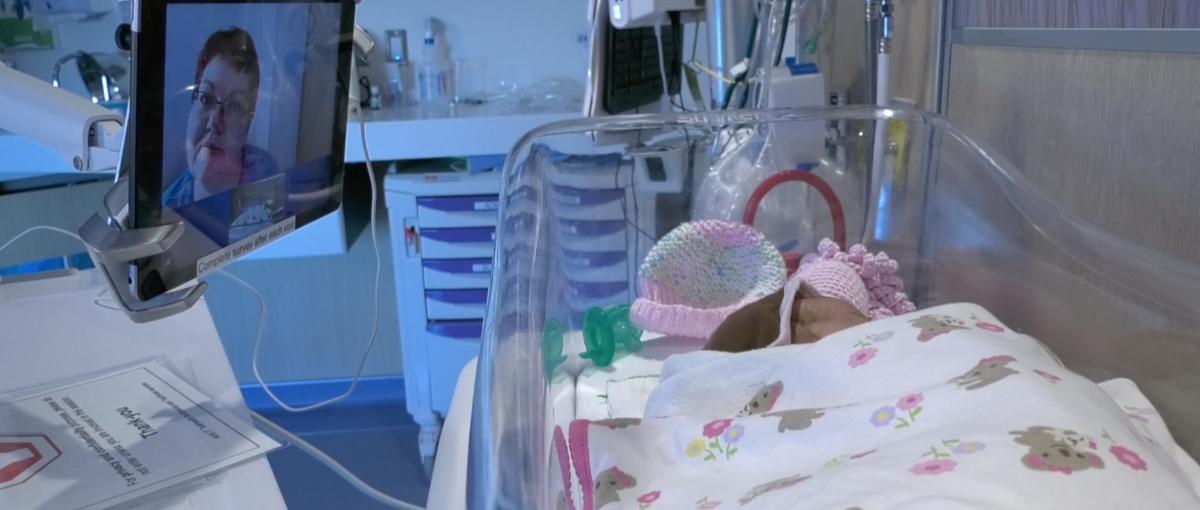Moms and babies connect through an iPad
Moms and babies at the Misericordia hospital can see and hear each other through first-of-its-kind iPad technology in Alberta

April 23, 2019
By Marguerite Watson, Senior Communications Advisor, Covenant Health
Kristin Korneluk didn’t feel connected to her baby, Quinn, until she was able to see and talk to her through an iPad.
“I distinctly remember seeing her for the first time under lights, and her birth finally felt real. I finally felt connected. Otherwise, I wouldn’t have had the opportunity to see my child,” Kristin says.
Mounted on a portable stand, the iPad technology used to help Kristin, 37, interact with Quinn is a secure videoconferencing system developed for parents whose babies are in the Neonatal Intensive Care unit (NICU) at the Misericordia Community Hospital. The new system, the first of its kind in Alberta, helps connect parents and babies who, for various reasons, are not able to be together physically.
In Kristin’s case, the separation was due to illness. She gave birth to Quinn two months prematurely while suffering from H1N1 pneumonia in both lungs in the hospital’s Intensive Care unit. At 4.3 pounds, Quinn had immature lungs and needed respiratory support to breathe. She was moved to the NICU, while Kristin was transferred into isolation on another floor.
“The iPads gave us a way to be together, even if we weren’t all in the same room,” says Kristin’s husband, Bob, 40.
Using the iPad system, formally called the NowICU project, parents and babies can see and hear each other. Parents can also ask their care teams questions through the iPads during daily hospital rounds.
The idea for the new technology came from Dr. Mehaboob Shariff Shaik, Facility Chief, Misericordia NICU, who asked a team of videoconferencing experts at AHS Virtual Health Services to develop it in collaboration with Covenant Health staff. He’d been hearing parents say they were missing important first moments with their children and wanted to ease the separation distress that happens in families.
The distress babies feel when separated from their mothers is well-documented, Mehaboob says. Their heart rates go up, they cry more, they sleep less and they don’t eat well. And mothers feel empty, as if something is missing. The iPad technology is filling an emotional and psychological gap by connecting mothers and babies as early as possible.
The stimulus of seeing her baby also helps a mother produce more milk, Mehaboob says.
Kristin and Bob used the iPad technology every day for a week until Kristin was able to visit Quinn in the NICU. By then, another family needed it. Since being launched at the Misericordia in November 2018, the iPad system has been used by at least one family a week.
Staff have also used the technology with mothers in other healthcare facilities in Alberta so they could be part of their babies' care at the Misericordia. For example, the technology helped a mother hospitalized in Red Deer stay connected with her baby after he'd been transferred to the Misericordia NICU. The NICU nurses set up the iPad in the baby's room and dialed into the TV videoconferencing equipment at the Red Deer hospital.
The Health Quality Council of Alberta recently recognized the NowICU project at the Misericordia with a Patient Experience Award. In the next few years, Mehaboob hopes to expand the technology to include software that families can download on their own tablets or smartphones to connect with their babies and care teams from home or other locations. “That’s the future, and I’d love to see the technology at that stage,” he says.
And Kristin and Bob think other hospitals should have the iPad technology, particularly to help families who are in smaller centres or rural areas.
“It’s a great service for people because it’s so important to have that time with your newborn,” says Bob.
After being in the NICU for 62 days, Quinn is now at home. She's doing well and getting used to life with her two older sisters, Kristin says. "We're very happy to finally have our family all together."